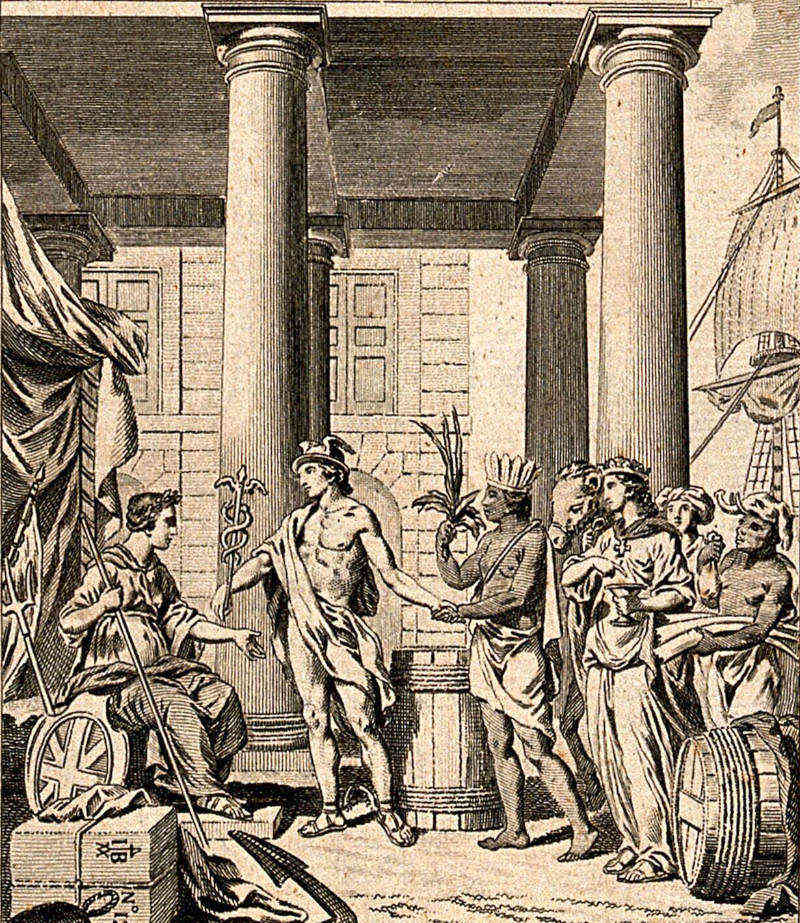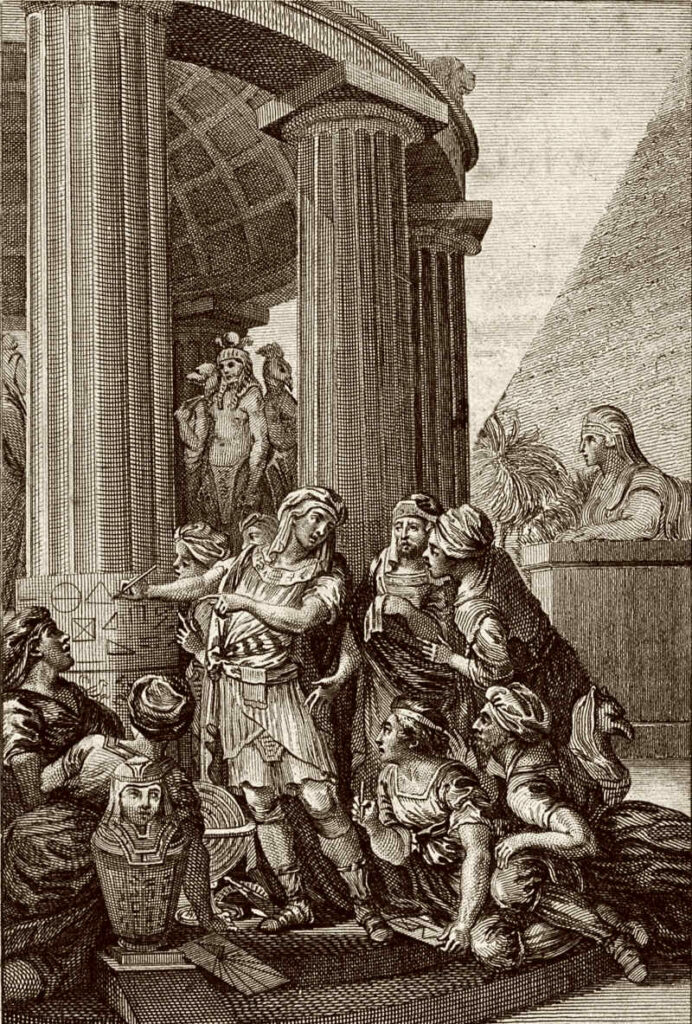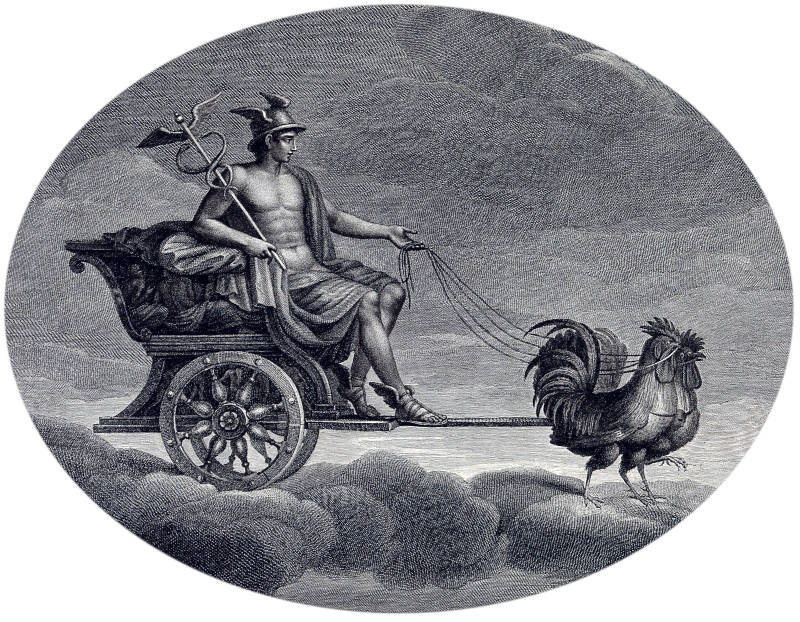Planet Summary
- Temperament: Cold, Dry—Melancholic
- Color: Multicolored
- Quality: Adaptable depending on configuration with other planets; diurnal as the morning star, nocturnal as the evening star
- Names: Hermes, Stilbon, Cyllenius, Arcas
- Rulership: Virgo, Gemini
- Metal: Quicksilver
- Keywords: Speed, Dexterity, Communication, Learning, and Wisdom
Mercury is the planet of knowledge, wisdom, reasoning, and intelligence. It is also associated with commerce and all displays of skill and thievery. In modern times, it has been linked to speed and communication. To understand how these characteristics were assigned to this planet, we have to understand both its celestial features and mythological associations. Let’s start with the first one.
Speed and Visibility
From the Earth’s perspective, Mercury is an elusive planet. It only appears briefly before the Sun rises or after the Sun sets, and there are even days that it is not seen at all. It is also the fastest planet in the modern sense of this word, and yet it does not distance itself from the Sun more than 27 degrees, taking approximately one year to complete its revolution around the zodiac. These characteristics are important because they help us understand the symbolism of Mercury in astrological thought.
Astrology constituted itself as an art and a science that studied the sky and stars from a geocentric perspective. That does not mean that astrologers have to believe that the Earth is at the center of the universe so they can practice astrology; it is all about our point of view, and how our perspective changes our understanding. That said, the aforementioned characteristics of Mercury are mostly what we can see from Earth with the naked eye.

Because of the Earth’s position relative to Mercury and the fact that this planet is the closest to the Sun, it will always seem near the Sun in our skies. It is also for this reason that Mercury completes its orbit in the shortest time compared to the other planets. From an astrological perspective, however, its speed is compensated for by a lot of retrograde motion—three retrogrades a year!
Retrograde motion is also all about perspective: no planet goes backward, but they appear to do so. From the Earth’s point of view, when Mercury achieves its maximum elongation from the Sun and appears to slow down until its speed is so slow that the Sun surpasses it, Mercury seems to be going in the opposite direction of the zodiac. It will then station direct and rapidly surpass the Sun again, repeating the process. Retrograde periods are the reason why Mercury, the fastest moving planet, takes the same amount of time as the Sun and Venus to complete a revolution around the zodiac.
The astrologer David McCann suggests that the common association in modern times of Mercury with themes related to speed is because it is the fastest planet according to our modern astronomical knowledge. However, its celestial characteristics explained above point to other mercurial meanings. For example, McCann explains that Mercury was originally associated with the Babylonian god Nabu, the celestial scribe. In the same way that Mercury is not always visible to the naked eye, scribes were frequently so immersed in their studies and work that they would not be seen for some time. This is directly related to the rulership of Mercury over knowledge and deep understanding.
Mixed and Unpredictable Nature
The star of Mercury has a twinkling light, which is the source of its ancient Greek name: Stilbon, ‘the Glistener”; that is, one of unreliable light, in the words of the researcher Deborah Houlding. Alongside its many retrograde periods and frequent disappearances, we find great clarification for one of the planet’s core meanings in ancient astrology: its tendency to define itself by the association with other planets. Mercury is “mixed”, as the 17th-century astrologer William Lilly would say. That is to say that it is not a planet with static characteristics but instead defines itself by its interconnectivity, its openness to the influence of others.

In the words of the 2nd-century astrologer Vettius Valens, “this star’s effects go in many directions, depending on the changes of the zodiac and the interactions of the stars, and yields quite varied results”. The outcome of the themes that this star rules tend to be “capricious in outcome and quite disturbed”, a consequence of its unreliable quality—even good results will have an unpredictable element to them.
In the words of Abu Ma’shar, an important medieval astrologer, “Mercury bends with his nature toward the one who is complected to him”. This means that its basic qualities vary; it is neither malefic nor benefic but varies according to the planet with which it associates. In the same way, Mercury is neither male nor female; neither diurnal nor nocturnal; even its basic qualities, dry and cold, could be heavily altered by its proximity to another planet.
Wisdom and Practical Knowledge

As the god of knowledge, Nabu was not static; there is a need to adapt and develop other ways of understanding when faced with new data or facts. Mercurial knowledge has a relationship with a deep understanding of reality, as we can see from the mythological figures associated with the planet. These include not only Nabu, but Thoth, the Egyptian god of knowledge and scribes, and the mysterious figure associated both with Thoth and Hermes: Hermes Trismegistus, founder of the hermetic tradition. Astrology itself is ruled by Mercury, as is geometry (understood as a way of comprehending the universe) and philosophy.
However, Mercury is also about technical and practical knowledge. Valens mentions a lot of professions as being ruled by Mercury: sculptors, doctors, architects, musicians, diviners, systematic physicians, and those in charge of war and strategy. Intelligence, quick wit, and dexterity are themes of Mercury. After all, it is quick and unpredictable in its movement. In the words of Valens, all “those making their livelihood with displays of skill, deception, gambling or sleight of hand” are signified by Mercury. This includes not only merchants but thieves, too.
From these associations, we already grasp the planet’s versatility, another key mercurial attribute. Mercury, the skillful one, is of complex understanding due to its mixed nature, prone to combine itself with others without restricting its possibilities.
Communication
One of the most frequent significations of Mercury in modern astrological practice is communication. We already saw that two of the gods associated with this planet were gods of scribes. Additionally, Hermes, the Greek version of Mercury, was the messenger of the gods. For these reasons and considering that eloquence is also a skill that can be perfected, Mercury rules themes related to communication: education, letters, interpretation, numbers, and public speaking. This is the reason why among the body parts Mercury rules the tongue and the hands, useful for writing, speaking, and for displays of skill, including stealing. Valens also includes the sense of hearing as a mercurial theme.
Mercury will not necessarily have to do with how we speak to others, but instead our natural eloquence and our proximity with letters and writing. For example, a mercurial influence on professional themes could signify a profession as a teacher, a writer, or public speaker.
Mercury in our lives
Different from the other planets, which do not signify a native’s personality, Mercury is associated with the intellect and the mind of a person. As such, it is one of the Ptolemaic lords of the mind and it will frequently be relevant in understanding a native’s disposition.
Mercury’s position in a chart will show us how our rational mind works. This will involve not only the signs but other elements: are there any aspects to Mercury? With which planets? What is the nature of the aspect? Is Mercury near the Sun, a debility called “combust”? Is it in the morning phase or is it in the evening phase? Many other chart factors could also be included in the analysis.

If we think of a Mercury with the power to express itself according to its nature (as in its domiciles, Gemini and Virgo, but not limited to them), it represents a person with a sharp mind and a desire for knowledge and deep understanding.
If Mercury is not very modified in its nature by other planets, it is typically melancholic, the humor also associated with Saturn. This means reserved natives dedicated to their learning and craft, those that prefer not to lose time on trivialities. They are just like the scribes of old. As Virgo is a powerful position for Mercury – its Exaltation and Domicile – and since it is an earth sign (a melancholic element), Mercury in Virgo means a sober, organized, dedicated, and slightly shy person.
On the other hand, Gemini brings us the most stereotypical significations of Mercury: a person interested in a lot of topics, joyfully curious, who loves to meet new people and have new experiences. Even if Mercury is naturally melancholic, in an air sign like Gemini it expresses itself in a more open, sanguine way. Here, we can think less of Nabu/Thoth, gods of the scribes, and more of the Greek Hermes, the messenger god who could visit any realm without restrictions. We can also think of the metal ruled by Mercury: quicksilver, a metal that is fluid at room temperature and is used in a myriad of functions. For Mercury in Gemini, it is all about fluidity.
The placements mentioned above are only the natural associations of the planet. However, the situation is quite different when we think of the water signs—Scorpio, Cancer, and Pisces—which were described by the ancient astrologers as mute signs, not prone to interaction with others but more of listeners, struggling to communicate properly and be heard. As mentioned before, the quality of Mercury depends on other factors in the chart; a combust Mercury, for example, can have a great impact on one’s communication ability. Mercury in a powerful house, such as the first and the tenth, will have its power strengthened, but if it is in a weak house like the sixth or the twelfth, can indicate difficulties in communication, excessive introversion and misunderstanding of situations. Of course, these examples are not to be taken too seriously since other elements in a chart could affect the outcome of Mercury.
References
- ABU MA’SHAR. Great Introduction
- GUTTMAN, Ariel; JOHNSON, Ken. Mythic Astrology: Archetypal Powers in the Horoscope
- KOLLERSTROM, Nick. Planets & Metals: The Traditional Association of Mercury & Quicksilver
- LILLY, William. Christian Astrology
- MCCANN, David. Mercury in Myth & Occult Philosophy
- PHILLIPSON, Garry. Mercury – Astrology’s Natural Significator
- TOMPKINS, Sue. The Contemporary Astrologer’s Handbook (Astrology Now)
- VALENS, Vettius. Anthologies. Trans. Mark Riley
- WATTERS, Joanna. Introducing Mercury
Images on this page
- mercury-winged-messenger: Wood engraving by Jonnard after W.B. Richmond, 1866 | Public Domain Mark 1.0
- mercury-god-trade: Etching by C. Grignion after S. Wale | Public Domain Mark 1.0
- mercury-hermes-trismegistus: Etching by Cook. Wellcome Collection | Public Domain Mark 1.0
- mercury-chariot-raphael: Engraving by C. Lasinio after Raphael, 1516. | Public Domain Mark 1.0
- mercury-chariot-maarten-de-vos: Engraving by J. Sadeler after M. de Vos | public domain
